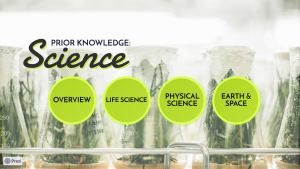46 Prior Knowledge: Science
Learning Objectives
-
Establish a baseline of prior knowledge for science concepts in order to prepare for the Science GED Exam.
-
Develop self-directed learning skills to facilitate student success and college and career transitions such as self-advocacy, critical thinking, organizational skills and curiosity.
Chapter & Discussion
This chapter includes a study guide that can be navigated in a classroom setting or independently. You can access the study guide via the link below.
Work through the different sections of the chapter and discuss ideas and topics as they arise. If you’re working independently, take notes instead. Notes and active discussion will be helpful in navigating this week’s assignments.
Note on Study Guides
Study guides in this textbook are specific in-depth modules designed to be navigated via the attached presentation. The chapter below will offer general information on this week’s topics. For a deeper look at these topics, please access the presentation linked above.
Overview
A majority of reading comprehension comes from your ability to connect what you’re reading to something you already know.
The Science GED Test is a reading comprehension test specifically for the type of reading that appears in science articles and journals. It will also ask you to comprehend visual data (charts and graphs).
The test won’t require you to memorize any facts or formulas, but it will assume that you have some background knowledge on the topics it covers.
Today, we’ll go over the foundation of prior knowledge that the GED Science Test expects you to be familiar with.
Life Science
This is the study of plants, animals, fungi, bacteria, and other living things. The GED wants you to have working knowledge about:
- Cells
- Relationships between different types of life
- Life support systems like photosynthesis and respiration
- Genetics: DNA, chromosomes, Punnet squares
- Evolution: common ancestry, natural selection
About 40% of the questions will relate to life sciences.

Physical Science
This is the study of matter and energy. The GED wants you to have working knowledge about:
- How matter works: the basic structure of atoms and molecules
- Energy: where it comes from, how it can be transformed
- Forces and how they apply to matter
About 40% of the questions will relate to the physical sciences.
Earth and Space Science
Earth and Space sciences include geology and astronomy. The GED would like you to have working knowledge about:
- The basic organization of our galaxy and solar system
- Earth systems such as the water cycle, climate & seasons, the atmosphere
- The effect of humans on the natural world: climate change, fossil fuels, natural disasters
About 20% of the questions will relate to earth and space sciences.

Assigned Reading
Here are this week’s readings. Additionally, please read for your own personal enjoyment for 1/2 hour each day. This will be called your “Reading Zone” reading and it will coincide with many upcoming activities.
GED Study Guide: Science (via GED.com)
Problem Set: Practice Your Skills
Problem Set 2: Physical Science
Problem Set 3: Earth and Space Science
Completing problem sets like this can be an important element of independent study towards completing your HSE. I write these to resemble the style of questions you’ll find on the RLA and Science GED tests.
Assignment: Science Concepts Self-Test
For each of the following concepts, write a short (one sentence or less) definition or explanation. Do this from memory.
Then, go over your answers using this week’s chapter. Highlight concepts in green if you feel confident and red if you need to go over them again.
Scientific Question
Hypothesis
Independent Variable
Dependent Variable
Single-Cell-Organism
Animal
The Food Web
Photosynthesis
DNA
Recessive Trait
Mutation
Natural Selection
Atom
Molecule
Phase of Matter
Thermal Energy
Gravity
Mass
Solar System
Axis Tilt
Climate
Evaporation
Greenhouse Effect
Assignment: Reading Zone Response (250 Words)
For Reading Zone, you must find a novel that is interesting to you and enjoyable to read. If you need help finding a Reading Zone book, please ask. Please read your Reading Zone book for a half-hour each day. On class days, there will be time in class dedicated to reading.
Create a two-paragraph response to the reading you did this week. The first paragraph should summarize what you read this week. The second paragraph should address the following prompt:
Would you recommend this book? What kind of audience would really like it? What are your biggest points of praise and your biggest criticisms?


